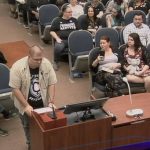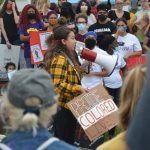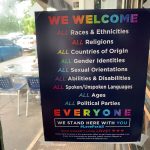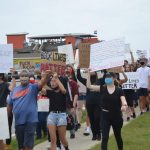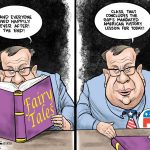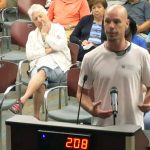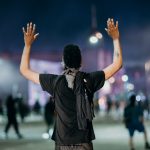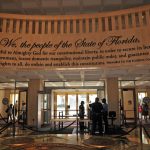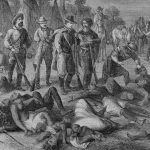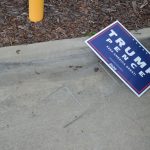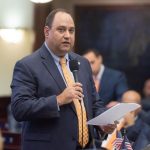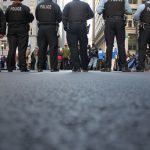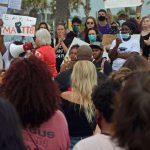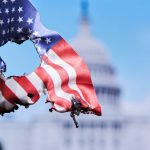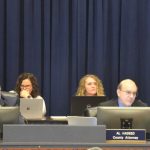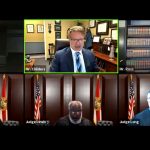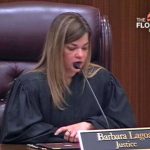In the wake of two turbulent school board meetings, Randall Bertrand was left wondering what all the sound and fury was about since many speakers’ loud and disruptive message was already made moot by school board votes or state policy.
First Amendment
Federal Judge Issues Injunction Against Florida’s Protest Law, Calling It ‘Vague and Overbroad’
Chief U.S. District Judge Mark Walker on Thursday blocked a controversial state law that enhances penalties and creates new crimes in protests that turn violent. Walker, who has frequently clashed with the DeSantis administration and the GOP-controlled Legislature, granted the plaintiffs’ request for a preliminary injunction blocking DeSantis and three sheriffs from enforcing the law.
Federal Judge Tangles with DeSantis Administration Lawyer Over ‘Rabbit Hole’ Protest Law
The Dream Defenders, the Florida State Conference of the NAACP and other organizations allege in a lawsuit that the measure, approved by Republican legislators and signed by DeSantis this spring, is unconstitutionally vague, has a “chilling” effect on First Amendment rights and gives local police too much power.
An FPC Student’s Perspective: Time to Rethink Inequitable and Irrational Dress Code in Flagler Schools
The district’s dress code is irrational, outdated, unfair and sexist. It limits individual expression, and it’s an utter waste of time, argues Jack Petocz, a junior at Flagler Palm Coast High School who calls on the school board to listen to students’ concerns and revise the code.
School Board Members Term Janet McDonald on ‘Witch Hunt’ and ‘Dangerous’ as She Guns for Board Attorney in Wake of Tuesday Tumult
School Board member Janet McDonald called for what would have been an unlawful, closed-door meeting to review the school board attorney’s contract, then called for any special meeting to review last Tuesday’s meeting, when the chamber had to be cleared because of the crowd’s rule-breaking. Two board members–Colleen Conklin and Cheryl Massaro–responded with withering criticism of their colleague.
Changing Crime Reporting Practices to Do Less Harm
Acknowledging that journalism can inflict wounds unnecessarily, AP will no longer name those arrested for minor crimes when the news service is unlikely to cover the story’s subsequent developments. Often, such stories’ publication hinges on an odd or entertaining quirk, and the names are irrelevant. Yet, the ramifications can loom large and be long-lasting for the persons named.
Is Islamophobia Hate Speech?
The central question that human rights tribunals must answer in these cases is whether false claims, such as those made by Mark Steyn in “America Alone,” a screed against growing Muslim populations in Europe, are so extreme that they’re likely to encourage hateful views and extreme action.
As Flagler Beach Grapples with Tawdry Pro-Trump Gatherings, City’s Wink to Surveillance Cameras Raises Questions
The weekly pro-Trump demonstrations featuring profane language in the heart of Flagler Beach has city commissioners concerned about the city’s image and the administration and police eying surveillance cameras they insist will not target the demonstrators, but be used as a tool in case of criminal activity. Others see a Pandora’s box.
The Seduction of Propaganda
Propaganda is communication as force; it’s designed for warfare. Propaganda is anti-democratic because it influences while using strategies like fear appeals, disinformation, conspiracy theory and more. Political communication is persuasion used in politics. It helps to facilitate the democratic process. Guess what Americans prefer.
A Qualified Defense of Trump Supporters’ Obscenities in Flagler Beach
Obscene pro-Trump demonstrators’ signs now flashing regularly in Flagler Beach are no different than signs using similar language at BLM marches. The fact that BLM marches have justice on their side, as Trump demonstrators do not, does not diminish the goons’ First Amendment rights.
Trump Before Trump: When Nixon VP Spiro Agnew Attacked News Media
In 1969 Spiro Agnew in a speech written by Patrick Buchanan attacked the press with almost unprecedented venom, anticipating a run of anti-media presidents that culminated with Trump. Buchanan later remembered that as Nixon read his proposed draft, he heard him mutter, “This’ll tear the scab off those bastards.”
Federal Judge Blocks DeSantis’ Social Media Law, Finding It “Riddled with Imprecision and Ambiguity”
The controversial law seeks to prevent large social-media platforms from banning political candidates from their sites and to require companies to publish — and apply consistently — standards about issues such as banning users or blocking their content.
Florida Adds Orwellian By-Laws to Academic Freedom
What do you do when a student endorses genocide during a class discussion? And follows it up with a two thumbs up endorsement for racism? Does curtailing disruptive behavior like this, which prevents others from learning, count as shielding students from uncomfortable “ideas and opinions”?
Federal Judge Doesn’t Hide Distaste for Florida Law Forbidding Social Media from Banning Users
Arguing that the law would violate social-media companies’ First Amendment rights and harm their efforts to moderate content, the industry groups have asked U.S. District Judge Robert Hinkle to block the law from going into effect Thursday as scheduled.
Florida Universities Are Now Required to Conduct Annual Surveys Measuring ‘Intellectual Diversity’
Under the auspices of intellectual freedom, Florida’s universities, colleges and and community colleges will be required to do an annual survey to ensure diverse views on campuses, including conservative opinions. At issue is that some lawmakers believe that colleges and universities are liberal bastions where conservative voices have been suppressed on campuses.
Supreme Court Upholds Religious Liberty Over LGBTQ Rights and Nods to Bigger wins for Conservatives Ahead
Last week’s Supreme Court ruling is narrow, but it means that any unequal treatment of religious groups will be regarded as a violation of the First Amendment, even if it comes at the expense of the dignity of LGBTQ citizens.
Florida and Seven Other States, All Republican-Controlled, Enact Anti-Protest Laws
Eight states have passed laws cracking down on protest activity since Black Lives Matter protests erupted across the United States last summer, according to the International Center for Not-For-Profit Law, which tracks such legislation. Similar bills are pending in 21 states, according to the Washington, D.C.-based center.
Critical Rage Theory
Critical race theory has been around almost 50 years and went mainstream 25 years ago, but Trumpist Republicans are discovering it only now, passing laws in several states to ban the teaching of critical race theory without understanding the first thing about it, but proving with every ban that it is less theory than fact.
City Hall Trespass Against Mark Phillips, Who’d Rushed Toward Mayor at May Meeting, Is Lifted
Mark Phillips, the North Flagler resident at the center of a tense moment at a May meeting of the Palm Coast City Council, when he aggressively rushed the dais toward then-Mayor Milissa Holland, is no longer trespassed from City Hall.
Voting Rights Advocates Seek to Block New Law’s Requirement that Limits Ballot-Initiative Contributions to $3,000
The American Civil Liberties Union of Florida and other supporters of three proposed constitutional amendments designed to expand voting want a federal judge to block a new state law that places a $3,000 limit on contributions to ballot-initiative drives.
Between Protest and Riot
Riots are easily distinguishable from protests, and there is a clear, bright line we can follow. The Florida law draws it, and the protests from my youthful heroes at the ACLU ring hollow, argues Christine Flowers.
State School Board Will Vote Next Week on New Rules Sanitizing History Teaching in Public Schools
The proposed rule would mandate that teachers “may not define American history as something other than the creation of a new nation based largely on universal principles stated in the Declaration of Independence.”
A Mostly Bleak Legislative Session for Open Government and the First Amendment in Florida
The Legislature approved 14 new exemptions to Florida’s Sunshine law and renewed eight, also approving a crackdown on social media companies while criminalizing certain protest activities.
Florida Education Department Wants History Classes Strictly Sanitized of Content Critical of the United States
A proposed rule that will be weighed by the State Board of Education aims to control the way history is taught in Florida classrooms and not allow teachers to “indoctrinate” students, as part of what state Education Commissioner Richard Corcoran called a “constant, vigilant fight.”
‘Enough’ Is Not Enough: Flagler’s Dangerous Leer at Extremism
What happened on Tuesday at the Palm Coast City Council is indefensible and dangerous. But it’s nothing new. We’ve simply not been paying attention to a perilous degradation of public discourse and behavior. We are slowly becoming a crueler community debased by primitive instincts, because no one in charge, or too few people in charge, are standing up and saying enough.
Texas Attorney General Forced to Unblock 9 After Lawsuit Claimed he Violated First Amendment Rights
Multiple courts have recognized that government officials who use their social media accounts for official purposes violate the First Amendment if they block people from those accounts on the basis of their viewpoints. Several elected officials in Flagler County routinely do so.
Why Facebook Created Its Own ‘Supreme Court’ for Judging Content
Facebook’s quasi-independent Oversight Board today upheld the company’s suspension of former President Donald Trump from the platform and Instagram. Six questions and answers on this Oversight Board that made one of the most politically perilous decisions Facebook has ever faced.
What Stolen Election Diehards Owe Holocaust Deniers
Holocaust denialism’s dregs on the fringe don’t get much attention because responsible institutions from publishers to campuses to media organizations kept them in their gutter. Election deniers are owed no less.
Florida Senate Passes DeSantis-Priority Bill That Would Force Political Candidates’ Speech on Social Media Platforms
The bill, in part, would bar social-media companies from removing political candidates from the companies’ platforms. Companies that violate the prohibition could face fines of $100,000 a day for statewide candidates and $10,000 a day for other candidates.
Lawyers’ Group Sues DeSantis Over Protest-Crackdown Bill Two Days After He Signs It Into Law
Civil-rights attorneys are challenging a new set of state laws that establish a crime of “mob intimidation” and enhance penalties for riot-related violence and looting, arguing in a federal lawsuit that the measures unconstitutionally “seek to arrest the peaceful expression of free speech.”
Bill Criminalizing Or Increasing Penalties for Certain Protest Activities Heads to Gov. DeSantis
The sweeping proposal, titled “Combating Public Disorder,” would create a new crime of “mob intimidation,” enhance penalties for riot-related looting and violence and create an affirmative defense for individuals who injure or kill violent protesters.
Citing Aesthetics and Law, Palm Coast Will Not Loosen Signage Ban, Whether for Realtors or Anyone Else
A majority of the Palm Coast Council rebuffed an attempt by Councilman Ed Danko to loosen the ban on Realtors’ open house and other signs in rights of way, saying both the city’s focus on beauty and a Supreme Court ruling on such signs leave no room for a shift away from current rules.
Bill Cracking Down on Protests Heads for Senate Floor Amid Outcries Over Free Speech and Discrimination
With critics warning that the bill would chill free speech and have a disparately negative impact on Black people, a key Senate committee Friday approved a controversial measure that Republicans argue is needed to crack down on violent protests.
Matanzas Student Who Wrote Song Threatening Dean’s Life Pleads to Deal That May Erase the Charge
Joseph Washington, 18, was arrested in January after Matanzas High faculty learned of a song he’d uploaded, threatening Tom Wooleyhan, a dean, by name. He was sentenced to 18 months’ probation on a third-degree felony charge, a plea deal the judge found surprising for its leniency. The charge will be dropped if Washington fulfills its terms over the next 18 months.
Gov. DeSantis Could Use a Civics Lesson on the Florida Constitution
Even as they push a $106 million proposal to improve civics education, our legislators and our governor persist in violating the Constitution by supporting legislation authorizing programs to send nearly $1 billion to private, religious schools in our state.
‘This Is Wrong,’ Attorney Says of Matanzas Student’s Arrest Over Rap Song Threat, Citing 1st Amendment
Matanzas High student Joseph Washington, 18, has yet to be charged almost seven weeks after his arrest on an accusation that he threatened a dean in a rap song posted to SoundCloud. On Monday, his attorney called his whole case “wrong” on First Amendment grounds.
The Golden Rule Is Not Cancel Culture
The Dr. Seuss estate’s decision to pull six books from reprints has nothing to do with cancel culture. That pair of terms has become its own dogmatic dumbbell anyway. Our misplaced nostalgia for books we were so fond of isn’t more important than the golden rule of looking out for our neighbors, to whom the same nostalgia translates as insult or put-down.
Divided Party Line Vote Pushes Florida House Bill Cracking Down on Violent Protests
Critics maintain that the proposals would have a chilling effect on participation in peaceful protests, violate free-speech rights and allow people who plow vehicles into crowded protests to avoid civil penalties if they injure or kill someone.
Republicans in Florida and Elsewhere Respond to Black Lives Matter with Anti-Protest Bills
Republican legislators in Florida and 21 other states are considering tough new penalties for protesters who break laws. As in Florida, some of the bills also would prevent localities from cutting police budgets and give some legal protection to people who injure protesters.
Controversial Bill Requiring ‘Viewpoint Diversity’ Surveys on Florida Campuses Wins Senate Backing
A controversial Senate proposal that would require Florida state colleges and universities to survey students about “intellectual freedom and viewpoint diversity” on campus cleared its first hurdle Tuesday.
Sedition Is Not a 1st Amendment Right, and There’s No Comparison With BLM Marches
Mob participants claim they were only exercising their First Amendment right to protest, and that Black Lives Matter protests and riots didn’t draw the same scrutiny. Both narratives are factual and moral frauds that hide behind liberal rationales to perpetrate reactionary lies and justify the unconscionable.
On WNZF, Flagler County Commissioner Joe Mullins Calls for Beheading Liberals
A few minutes into his latest weekly infomercial on WNZF radio Saturday morning, Joe Mullins, the Flagler County commissioner, called for the beheading of liberals while decrying responses to the Covid-19 pandemic.
The Trump Administration’s Final Push to Make It Easier for Religious Employers to Discriminate
Last-minute policies on religious freedom clear the way for employers to hire on the basis of faith. Some of the changes won’t be easy for Biden to undo.
Local Governments Seek Re-Hearing in Federal Case That Allowed ‘Conversion Therapy’ Targeting LGBTQ Youths
Local Florida ordinances that a federal court found unconstitutional had barred therapists from providing treatment or counseling that is designed to change minors’ sexual orientation or gender identity. Critics of such therapy say it harms minors who are lesbian, gay, bisexual or transgender.
Court’s Conservatives Are Right: Pandemic Limits on Houses of Worship Are Unconstitutional
The Supreme Court’s ruling overturning its own recent precedent to forbid attendance limits at houses of worship because of Covid was not an ideological decision so much as a victory for the First Amendment that liberals should be thankful for.
Florida Lawmakers Again Will Consider Requiring Moment of Silence in Schools
An effort to require public-school students to engage in a moment of silence at the start of each school day is back before the state Legislature. Sen. Dennis Baxley, R-Ocala, refiled legislation (SB 282) on Thursday that would require principals to direct first-period teachers to set aside one to two minutes for “quiet reflection.”
Why Was Flagler’s County Administrator Allowed to Illegally Start a Public Meeting With a Christian Prayer?
A county commissioner read out a long and explicitly Christian prayer prepared by County Administrator Jerry Cameron at Monday’s commission meeting, breaking decades of precedent without prior legal review, public discussion or commissioners’ prior knowledge.
Oral Arguments on Alachua’s Mask Mandate Evoke Hijabs, Nazis, KKK, Crime and, Finally, Public Health
Oral arguments about Alachua County’s mask mandate before a three-judge panel of the First Circuit Court of Appeal Monday was a spectacle of audacious leaps and strange analogies that nevertheless illustrated the sharp and far from resolved divide between mask proponents and anti-maskers, including on the judicial bench.
Court’s Trump Appointees Strike Down Florida Bans on Bigoted ‘Conversion Therapy’ Aimed at LGBTQ Children
Two South Florida ordinances barred therapists from providing treatment or counseling that is designed to change minors’ sexual orientation or gender identity. Critics of such therapy say it harms minors who are lesbian, gay, bisexual or transgender. The federal court ruled against the ban on First Amendment grounds.
11th Circuit Upholds Firing of Sandy Hook Massacre Denier and Florida Atlantic University Professor
A three-judge panel of the 11th U.S. Circuit Court of Appeals on Monday rejected James Tracy’s First Amendment arguments that he was fired in retaliation for views posted on a blog. The panel upheld a jury’s decision on the First Amendment issue and a district judge’s rulings against Tracy on other issues.




